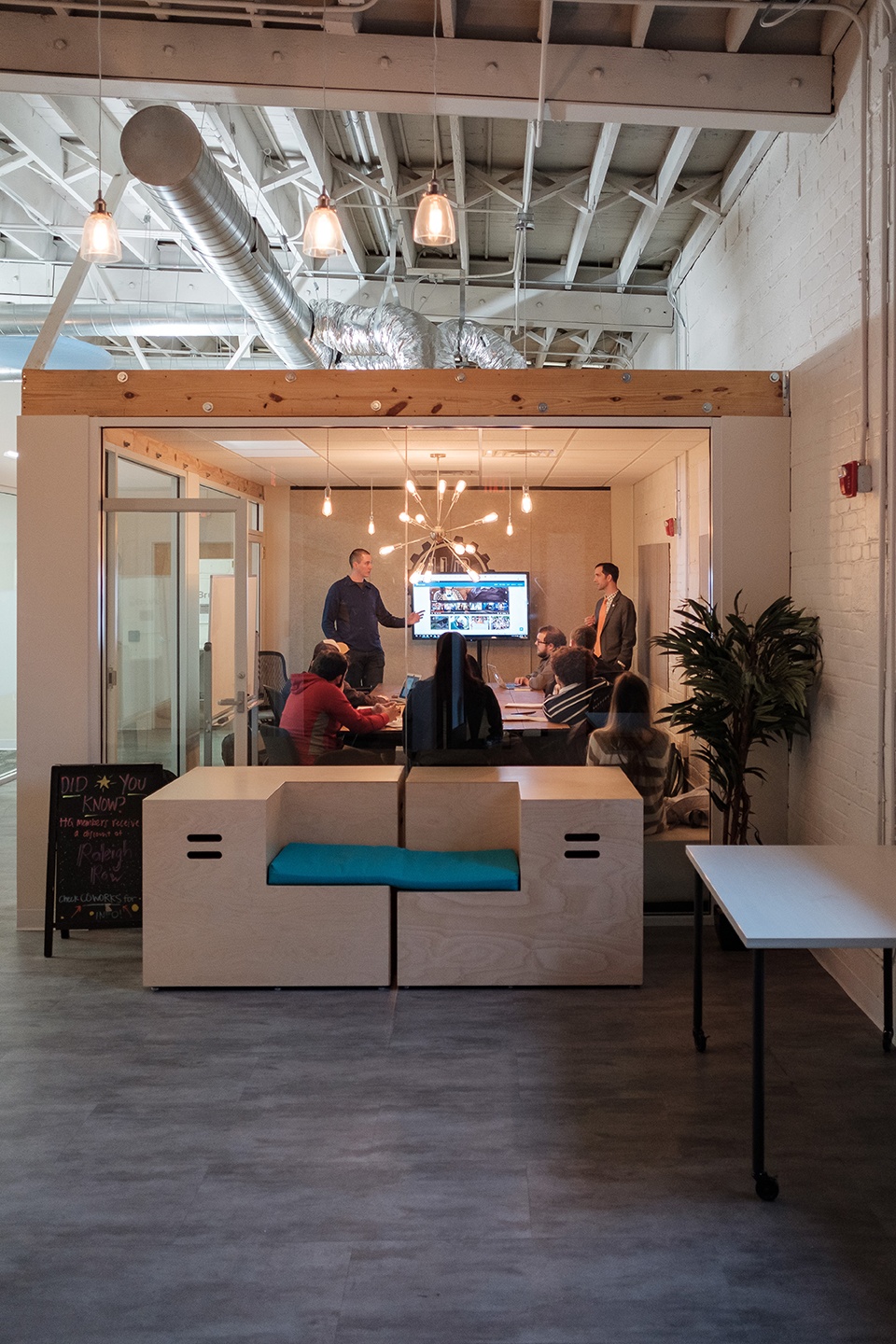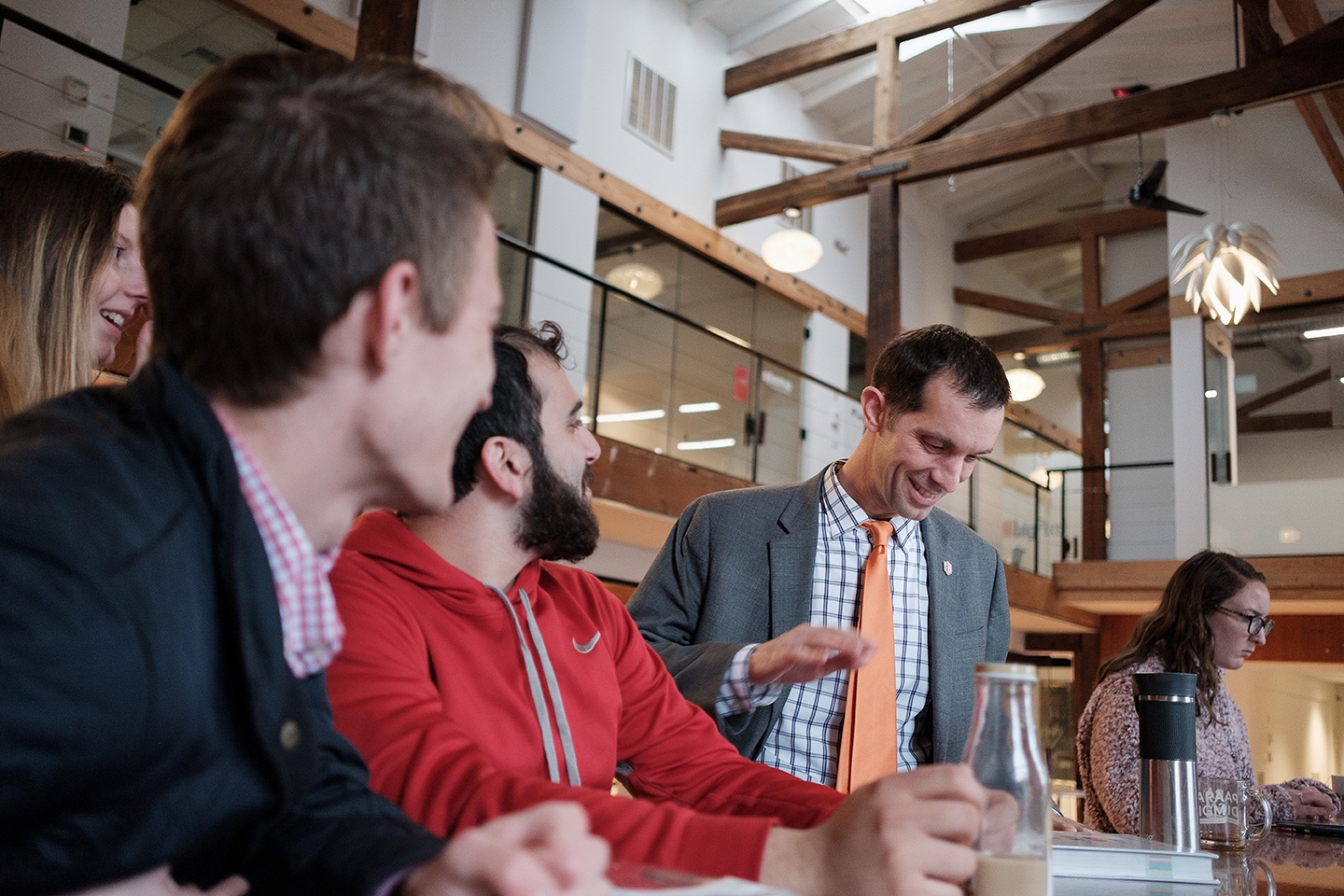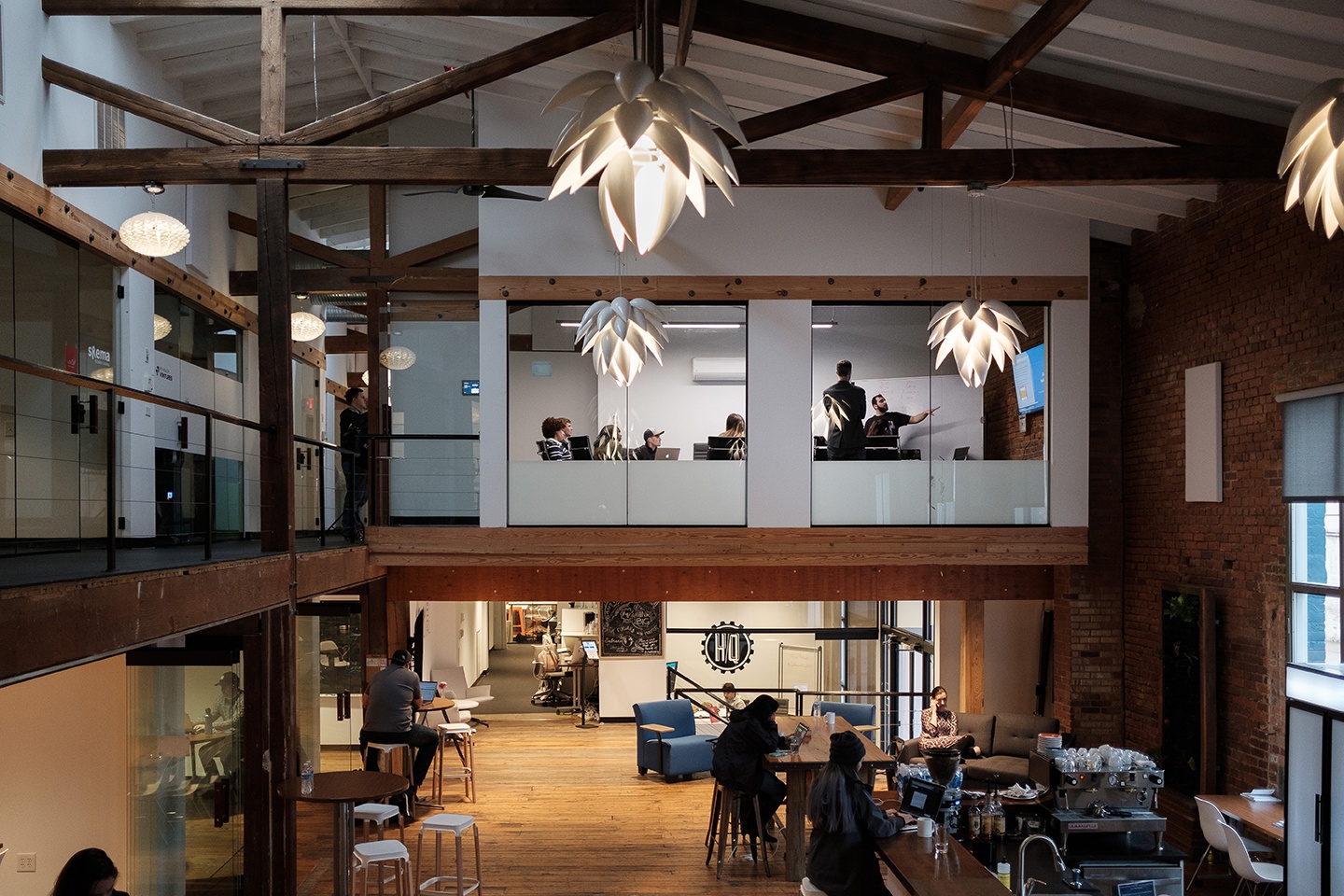Campbell students team up with their peers, entrepreneurs and start-up companies in sleek downtown Raleigh co-working hub
By Kate Stoneburner
Before college, MaKayla Brewington could count on two hands the number of times she’d visited Raleigh.
She only lived 40 miles away.
Growing up in Dunn, what Brewington did see a lot of — almost daily — was Campbell University. Her dream after high school was to “get out of town” and explore the state, living in and attending college in a big city. Staying in Harnett County was never part of her plan.

Fortunately, things don’t always go as planned. Today, Brewington is an invested first-year student at Campbell who is well on her way to completing the School of Business’ 4+1 MBA program.
“Campbell was always familiar to me, or at least that’s what I thought. I knew it was small, rural and friendly,” says Brewington. “But I got to know some professors on my tour and realized that this school is way more than what you see at the two roundabouts. At Campbell, I get to be more than a number.”
Her decision to stay home hasn’t dashed “big city” dreams, however. Brewington makes that 40-mile trek to Raleigh every Wednesday for her marketing class at Campbell in the sleek, comfy confines of HQ Raleigh, a co-working entrepreneurial hub and accelerator in the capital city’s downtown Warehouse District. There, she and 13 other Campbell students network with entrepreneurs, work alongside marketing companies and learn about what careers in business look like in the real world.
The University’s HQ Raleigh suite provides resources for experimental education, giving students the opportunity to team up with peers, entrepreneurs and start-up companies. Students also have the chance to participate in dynamic presentations, workshops and tours.
The workspace is part of the Campbell Business School’s outreach efforts to engage the Raleigh business community and its entrepreneurial network.
Scott Kelly is the impetus behind Campbell’s HQ Raleigh program and the professor whose enthusiasm sold students on the weekly 45-minute drive from Buies Creek to Raleigh for a three-hour long block class. In a small Campbell-orange office on HQ’s first floor, Kelly personifies the marketing principles he teaches his students by serving as the face of Campbell Business to Raleigh entrepreneurs.
“When we give a tour of the Buies Creek campus, we’re marketing,” Kelly says. “The way our buildings look is marketing, and so is our presence in this entrepreneurial hub. Being here in Raleigh says our business students are learning from the experts.”
Campbell’s rented space at HQ is a small one for now, but it is open to all Campbell students and staff who find themselves with a project in Raleigh. In fact, plans are in the works to launch more HQ-based classes so that students who make the trip travel for more than a single class. A weekly “Raleigh day” would allow students to study marketing with marketers, government and civics with legislators or religion with the city’s many faith communities.
“Campbell students have the best of both worlds,” says Kelly. “They can spend time on campus in a safe environment where they can develop purpose, grow skills and make mistakes. Then they can plug into the Raleigh business community through our partnership with HQ Raleigh and gain real-world experience.”

Typically, Campbell’s hands-on learning initiatives take students to rural areas as part of the university’s mission to serve the underserved. Although his class takes students out of Buies Creek, Kelly is a proponent of bringing what the students learn in Raleigh back to those areas that need innovators the most.
“We would love to see all departments feel welcome to utilize this space in the capital city,” Kelly says. “But we can hold true to our roots. We are a rural school and we are about disadvantaged rural communities. We need to be clear that we are here to learn with the potential to take our experiences back to areas in Harnett county and beyond.”

Kelly’s marketing class takes a bit of Buies Creek to Raleigh each week, listening to country music over the conference room speakers before class. It’s not uncommon to find students sitting at the counter of HQ’s espresso bar or chatting with other workers on Wednesday afternoons. They are encouraged to arrive early and hang around after class to network, and many take advantage of the opportunity. Between the drive, the networking buffer and the class itself, students easily commit five hours of their day to one course — not even considering homework.
When it comes to making the class worth the time, Kelly has found that all it takes is good atmosphere, practical application of material and never letting students stay still. Each week, he assigns a chapter of reading and introduces a relevant local business that the class tours. The students start the afternoon in HQ Raleigh’s conference room to review the text, but they always end up in a new location, thinking through real-world prompts given to them by the local business and then presenting their marketing plans to whatever “client” Kelly has introduced.
So far this spring, students have carried out mock marketing plans for a variety of companies in Raleigh, touring a chocolate factory and a denim manufacturer to examine best practices for locally-owned businesses and working with marketing and sales companies like Nine Mile and RevGen to see how social media strategy can target segmented audiences.
The class recently collaborated with Tom Jacobs, an alumnus and founder of Activent Marketing, to try their hand at event marketing. After sampling a brand new product (protein chips) from one of Jacobs’ clients, the students broke off into groups in Raleigh’s Union Station and brainstormed ways to introduce the product at a Spartan Race to be reviewed by Jacobs.
“Raleigh is such a hub of creativity and inspiration,” says Jacobs. “It’s great that the students can get an inside look at how that translates into real-world business and entrepreneurship.”

The inside look into businesses is many students’ favorite part of the HQ experience. For some students though, the atmosphere alone makes HQ worth the drive. While co-working spaces are easy to find for free — the public library and local Starbucks come to mind — Kelly’s students insist that there’s something different about HQ Raleigh.
“You can talk and network with people going after their ideas.”
“There’s an industrial spirit that’s almost tangible. And you get so much exposure.”
“Getting to see real companies is the highlight of my week. When I call my parents, I tell them about the businesses we’ve been to.”
Bryan Sanders summed up the atmosphere with a comparison to the value of retail stores.
“Retail is going online. So why are Apple stores still doing okay?” he says. “It’s not just because people like to hold a phone in their hand to make sure it feels like a good fit. The atmosphere of Apple stores is so open and their customer service is so key. The same can be said of HQ Raleigh. It’s all about the atmosphere.”
They might come for the aesthetic, but students are staying for the job opportunities. Campbell alum Jacob Bartlett leveraged a full-time position at Lithios, an app development company with offices right above the Campbell HQ space. Current senior Daphanie Doane’s classes at HQ Raleigh ended up landing her a position with the co-working company itself. As community coordinator, she acts as an event organizer and host for the warehouse location, all while maintaining her full-time student status and living in Buies Creek. Doane takes online classes, usually working from HQ, and stays active on campus with a variety of student organizations.
Kelly encouraged Doane to apply, but also warned her that she’d have to take a semester off to work the full-time gig. Instead of taking a semester off, she also decided to take her classes online, at night and at HQ to work around the time crunch. Now, Doane is the go-to for putting in work orders, organizing events and planning community outreaches.

“I live in [off-campus apartments] in Buies Creek and commute here every day, and it is worth it,” says Doane. “It’s not just a job that’s paying off school for me — it’s more about the experience and figuring out if business outreach is what I want to do. I know that if I don’t want to work for HQ after graduation, I have options with the connections I make here.”
Brewington, too, says that the drive is always worth it. She and her peers often carpool to save on gas, but even when she drives alone, she takes pride in the fact that she can navigate downtown Raleigh without her GPS. Her classes in the business school have her considering various ways that she can turn her love of volunteering into a career. The oldest of five, Brewington is looking into careers in the nonprofit sector serving children.
“I usually hang out around here until rush hour is over and I love being connected to Raleigh through this class,” says Brewington. “It’s more hands-on than an on-campus lecture. We can explore a lot of private companies here. It’s a harder sell to get experts in entrepreneurship to drive out to us in Buies Creek.”
At the end of the day, making connections for his students is what sustains Kelly’s belief in the power of Campbell HQ Raleigh.
“When a Campbell student graduates, how many ‘touches’ with the real world did they experience? Beyond reading books, how many times did they have a real-world engagement that provided a clear vision of what their field is like? Not every program at a liberal arts school has a built in rotation process like medical programs do, but with the help of this space, I believe our faculty can provide those experiences for students of all majors.”


